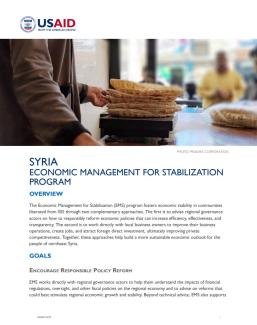OVERVIEW
The Economic Management for Stabilization (EMS) program fosters economic stability in communities liberated from ISIS through two complementary approaches. The first is to advise regional governance actors on how to responsibly reform economic policies that can increase efficiency, effectiveness, and transparency. The second is to work directly with local business owners to improve their business operations, create jobs, and attract foreign direct investment, ultimately improving private competitiveness. Together, these approaches help build a more sustainable economic outlook for the people of northeast Syria.
GOALS
Encourage Responsible Policy Reform
EMS works directly with regional governance actors to help them understand the impacts of financial regulations, oversight, and other fiscal policies on the regional economy and to advise on reforms that could best stimulate regional economic growth and stability. Beyond technical advice, EMS also supports regional governance actors to create and implement plans for reforms and changes, particularly in key economic sectors for northeast Syria, such as agriculture subsidies. Across these efforts, EMS works to incorporate measures that build transparency, increase public trust, and attract foreign direct investment.
Improve Private Sector Competitiveness
EMS support in this area focuses on promoting competitiveness across key sectors in northeast Syria. EMS does this by providing tailored advisory technical support to local Syrian businesses to improve business operations and attract private sector investment. This is often centered around developing new and/or improving management processes within businesses that remove constraints to scalability and long-term growth. These efforts are vital ingredients for stability, job growth, and reducing dependency on foreign assistance in non-regime-held areas of northeast Syria. EMS also works with regional governance actors to set the best conditions for private sector growth and increased trade.
KEY RESULTS
EMS activities have led to $9.5 million in new investments in the region, including $5.5 million in foreign direct investment.
- In 2023, EMS partnered with the Near East Foundation to provide financial literacy information and distribute micro-loans worth up to $2,000 to 104 farmers. In total, USAID provided $130,700 in micro-loans to eligible borrowers.
- Syrian businesses receiving EMS advisory support reported a combined 150 percent increase in sales–from $13 million to $33 million.
- With EMS advisory technical support, Self-Autonomous Administration of Northern and Eastern Syria (SANES) published financial reports for the first time in 2021 and 2022 to increase transparency of public expenditures. Additionally, EMS advisory technical support led SANES to adopt the International Monetary Fund’s Global Financial Statistics standards in developing and tracking public budgets and expenditures, improving budget efficiency and fiscal transparency.
- Since 2022, EMS directly advised 75 businesses across northeast Syria on improving their business operations. The activity resulted in nearly 2,000 new jobs created.
- In 2022, EMS advised 12 major animal feed companies in northeast Syria. The companies increased egg production by more than 27 million additional eggs, generating $20 million in additional sales for more than half of the animal feed industry in northeast Syria, and ultimately bringing more eggs to the market for local Syrians.
- EMS technical advisory support led to groundbreaking efforts to regulate and license money transfer agents, including subjecting them to anti-money laundering and counter-terrorism safeguards for financial transactions in northeast Syria. Future efforts will continue to build the framework for microfinance and banking regulations in the region.


